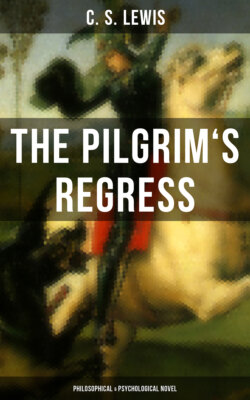Читать книгу THE PILGRIM'S REGRESS (Philosophical & Psychological Novel) - C. S. Lewis - Страница 12
На сайте Литреса книга снята с продажи.
Chapter Two
The Hill
ОглавлениеTable of Contents
Then I saw John bounding forward on his road so lightly that before he knew it he had come to the top of a little hill. It was not because the hill had tired him that he stopped there, but because he was too happy to move. ‘There is no Landlord,’ he cried. Such a weight had been lifted from his mind that he felt he could fly. All round him the frost was gleaming like silver; the sky was like blue glass; a robin sat in the hedge beside him: a cock was crowing in the distance. ‘There is no Landlord.’ He laughed when he thought of the old card of rules hung over his bed in the bedroom, so low and dark, in his father’s house. ‘There is no Landlord. There is no black hole.’ He turned and looked back on the road he had come by: and when he did so he gasped with joy. For there in the East, under the morning light, he saw the mountains heaped up to the sky like clouds, green and violet and dark red; shadows were passing over the big rounded slopes, and water shone in the mountain pools, and up at the highest of all the sun was smiling steadily on the ultimate crags. These crags were indeed so shaped that you could easily take them for a castle: and now it came into John’s head that he had never looked at the mountains before, because, as long as he thought that the Landlord lived there, he had been afraid of them. But now that there was no Landlord he perceived that they were beautiful. For a moment he almost doubted whether the Island could be more beautiful, and whether he would not be wiser to go East, instead of West. But it did not seem to him to matter, for he said, ‘If the world has the mountains at one end and the Island at the other, then every road leads to beauty, and the world is a glory among glories.’
And forthwith has his first explicitly moral experience
At that moment he saw a man walking up the hill to meet him. Now I knew in my dream that this man’s name was Mr. Vertue, and he was about of an age with John, or a little older.
‘What is the name of this place?’ said John.
‘It is called Jehovah-Jirah,’ said Mr. Vertue.
Then they both turned and continued their journey to the West. After they had gone a little way Mr. Vertue stole a glance at John’s face and then he smiled a little.
‘Why do you smile?’ said John.
‘I was thinking that you looked very glad.’
‘So would you be if you had lived in the fear of a Landlord all your life and had just discovered that you were a free man.’
‘Oh, it’s that, is it?’
‘You don’t believe in the Landlord, do you!’
‘I know nothing about him—except by hearsay like the rest of us.’
‘You wouldn’t like to be under his thumb.’
‘Wouldn’t like? I wouldn’t be under anyone’s thumb.’
‘You might have to, if he had a black hole.’
‘I’d let him put me in the black hole sooner than take orders if the orders were not to my mind.’
‘Why, I think you are right. I can hardly believe it yet—that I need not obey the rules. There’s that robin again. To think that I could have a shot at it if I liked and no one would interfere with me!’
‘Do you want to?’
‘I’m not sure that I do,’ said John, fingering his sling. But when he looked round on the sunshine and remembered his great happiness and looked twice at the bird, he said, ‘No, I don’t. There is nothing I want less. Still—I could if I liked.’
The Moral Imperative does not fully understand itself
‘You mean you could if you chose.’
‘Where’s the difference?’
‘All the difference in the world.’
